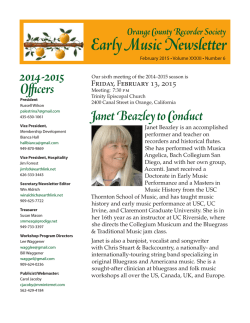
more info on Summer Schools 2015
Summer Schools July - August 2015 The Third Age Trust thanks The Educational Foundation for Lifelong Learning for its generous financial support of the U3A national summer schools. Introduction In 1998, the Standing Committee for Education (SCE) came up with the idea to organise a national summer school to provide U3A members with an opportunity to participate in a residential study experience. In 1999 Phyllis Babb (Sarum U3A) and a member of the SCE organised the first school in York and it was so successful that national summer schools became an integral part of U3A life, with 2 schools a year being organised from 2002. The summer schools are a wonderful example of self-help learning with all the tutors being U3A members, who give up a significant amount of their time to provide attendees with an enjoyable and participatory learning experience. The usual pattern of a summer school is arrival on the Monday afternoon with an introductory seminar before dinner, approximately 5 hours of seminars on both the Tuesday and the Wednesday and 3 hours on the final morning, with plenty of breaks and opportunities for socialising with U3A members from all over the UK. Harper Adams University, Newport, Shropshire, TF10 8NB Monday 13th to Thursday 16th July 2015 Royal Agricultural University, Cirencester, GL7 6JS Monday 17th to Thursday 20th August 2015 Harper Adams University ART HISTORY La Belle Epoque – France – 1890-1914 Tutor Maria Chester La Belle Epoque emerged in Paris – the city of light – in the last decades of 19th century. Paris was the centre of action. Life was vital and meant to be lived. Modernity was the moving spirit. It was the time of the machines: painters were finding the way to represent movement. The Argentinian tango was danced along with the popular Johan Strauss waltzes. Russia brought its Ballet Russes and Nijinsky was a celebrity. The Lumiere Brothers were showing short films and soon Gaumont and Pathe were opening cinemas…and one day, it was all over. That day was August 4th 1914. The day WWI started. I thought that we could celebrate the splendour of France’s “Belle Epoque” by analysing the work of painters, listening to “avant-garde” music and watching short documentaries trying to catch the spirit “la joie de vivre” of those magic days. At the end, we’ll watch a BBC film “Le Sacre du Printemps” (The Rite of Spring) that portrays the dark relationship between Diaghilev and Nijinsky and the primitive Igor Stravinsky orchestral concert. Level of ability Suitable for all. Teaching style Mixture of lectures, videos, documentaries, music and dance. CREATIVE WRITING Tutor Gilly Beckett The theme of this course is writing short fiction and exploring the allimportant elements required to produce a short story. We will be examining the various artistic ‘tools’ that we can utilise and bring into play to enrich our individual requirements, towards producing a story that excites the imagination of the reader – as well as the passion of the writer. The concepts of dialogue, identifying our characters, the setting and the pacing of events, as well as the development of the story are some of the fascinating and essential aspects to be highlighted in this course. Harper Adams University 4 Level of ability You are already writing? You are eager to get started and develop your ideas? The course presents a fusion of exercises and concepts to inspire and encourage regular writers and those who consider themselves beginners. In short, creative stimulation for all. Teaching style The course will consist of seminars and occasional small group activities. FRANCE Regards sur la France d’aujourd’hui Tutor Louisette Johnson I am a French native and I would like to share the love and knowledge of my country with you. We shall look at some aspects of French life today using recent newspaper and magazine articles, tapes, songs, quizzes etc. The course will be conducted in French and should help you to develop your language skills, while gaining confidence. If you have any queries about the level of ability required, please contact the tutor, Louisette Johnson, telephone 01491 572608 or email louisettejohnson@ yahoo.co.uk. Level of ability You should have a good level of French, ideally at A-level standard, if you are to benefit fully from the course. You should be able to understand written and spoken French and you will be expected to join actively in discussions in French. Please bring a bilingual dictionary and a short exposé in French on a French town or an aspect of French life which interests you. 5 Teaching style My aim is to provide a relaxed atmosphere while offering interesting and worthwhile content. I like to promote understanding and communication in French in an active, varied and fun way. Summer Schools 2015 FILM HISTORY Directors in Focus Tutor Alan Coulson Though the stars are better known to the public, cinema is basically a director’s medium. Using copious film extracts, interviews and comments from film historians, this course reviews the work of a variety of well-known directors. I have received very good feedback for a programme focusing on directors. This year, in addition to examination of some Hollywood stalwarts like William Wyler, John Ford, Clint Eastwood and George Cukor, I hope to include some European directors (DeSica, Rossellini, Bergman, Haneke perhaps) and contemporary British directors such as Ken Loach, Stephen Frears, Danny Boyle and Mike Leigh. Level of ability Suitable for all. A love of films is the only pre-requisite. Teaching style Presentation of film extracts, interviews and commentary (about twothirds) with questions and discussion (about one third). PHILOSOPHY / LITERATURE Novel Ideas & Winning Words Tutor Meg Shaw ‘One novel in a thousand has the quality a novel should have – the quality of philosophy’ Doris Lessing. We shall study a selection of novels in the light of this statement. The themes will be drawn from the main books which are ‘The Golden Notebook’ Doris Lessing; ‘The Sea The Sea’ Iris Murdoch; ‘Possession’ A S Byatt and ‘The Ghost Road Trilogy’ Pat Barker. These will be supplemented by contributions from group members who will be asked to bring one novel published since 1960 to share with the group. It is not essential to bring the main books to the school as extracts will be provided. Level of ability No previous experience will be assumed but would be welcome. Harper Adams University Teaching style Mix of presentations, discussion and small group work. 6 PRACTICAL THEATRE PROJECT ‘In Our Time’ Tutor Helen Baron The project will use devised theatre techniques, where material is generated from students’ own ideas and experiences. We will develop an original play with a running order but no set written script. On the first day, students will get to know each other, and generate and discuss ideas. The following days will be spent shaping and developing a short play provisionally titled ‘In Our Time’. Students will be invited to bring any portable materials which might be useful for developing the play e.g. photographs, music, small props, hats. The course will be an absorbing and enjoyable learning experience based on creative collaboration. Please contact the tutor if you have any queries: [email protected]. Level of ability Students do not need any previous drama or theatre experience, though those with experience will be very welcome. You should be willing to contribute to the development of ideas as a member of a group. Teaching style This is a practical course where the tutor will act as a facilitator, providing initial guidance and a possible framework for developing the play. Students will be encouraged to improvise and create a short play for performance. RECORDER ENSEMBLE Tutor Ursula Steiger This course has proved popular with small recorder groups and lone players. It is aimed at those who can play at least one recorder reasonably well and who are familiar with some basic music theory. An ability to read music and play in at least three keys will help, but we will take time to learn each part of a piece. Above all else, what members need to enjoy this course is a willingness to embrace the challenge of learning new skills and sharing the joy of making music with others. The course requires a fairly high level of concentration. We try to relieve this with opportunities for small group playing, including a help group intended primarily for descant players. The music we play varies a great deal but this year we shall concentrate on some of the traditional, baroque recorder music, interspersed with one or two more modern pieces. 7 Summer Schools 2015 Members will be asked to purchase the music provided and the amount will not exceed £10. Should you wish to ask any question before booking please telephone the tutor, Ursula Steiger, on 01227 711536. It is absolutely essential that you bring a folder for your music, as well as a pencil and eraser, your recorder/s and a music stand. Level of ability You need to be able to play reasonably well on your chosen recorder. The better you are at sight-reading and playing in different keys the easier it will be for you. If you would like to improve your playing by making music with a large group, this may well be your opportunity. Teaching style This will be a mixture of coaching players to achieve a good tone, of learning a number of pieces for playing in the ensemble and of helping participants to gain confidence in themselves and in their playing. Above all, the atmosphere will be non-threatening and inclusive and we aim to have fun! SHAKESPEARE AND THE SUPERNATURAL Tutor Linda Shannon Shakespeare and the Supernatural (including numerology in Macbeth, the dark heart of A Midsummer Night’s Dream…and the calm moments in The Tempest). The course will begin with a brief biography of Shakespeare, followed by an analysis of iambic pentameter and what its use and misuse can tell us. The beliefs of the time will give us a context. Then we will discover and explore the magic, the monsters, the gods, fairies and spirits that are in these three plays. Students will be working in groups of varying sizes and ideally should be prepared to read selected scenes aloud. There may even be some performances on DVD for us to watch. Please contact the tutor if you have any queries: l.shannon082@btinternet. com. Level of ability No ability other than an interest in Shakespeare and a willingness to read aloud. It won’t be necessary to have read the plays beforehand because a synopsis will be sent to students prior to the course. Harper Adams University Teaching style Introductory talks, small and large group work, reading aloud, discussion and watching extracts on DVD. 8 WHAT IS THIS THING CALLED MATHEMATICS? Tutor John Baylis What do mathematicians actually do? How are they motivated by beauty, logic, truth, efficiency? How are truth, proof and certainty related? The topics will come from a wide range of mathematics, but will all illustrate techniques and principles important throughout, e.g. how are the ‘rules of maths’ justified? Can infinity be handled consistently? What insights come from games? What if the maths violates common-sense? If you know two proofs of the same result, which is the better one? If you suspect that ‘higher’ maths is rather more than harder sums, come and see what that something more is. Level of ability Anything from O-level maths to a maths degree. Wherever you are on this scale, the thinking will be hard, not the maths! The required technical knowledge is minimal. The topics covered will all illustrate some aspect of mathematical thinking, giving scope for discussing as well as doing. Teaching style Mix of lecture, discussion and investigation, probably requiring a critical rethinking of cherished beliefs. Please contact the tutor if you have any queries: telephone 01437 731103. 9 Summer Schools 2015 Royal Agricultural University DRAMA 20th Century American Tutor Rosamund Hall From a pile of plays, including works by Saroyan, O’Neill, Tennessee Williams, Miller, Albee and Neil Simon – I shall choose three to focus on. A few contrasting scenes will be added, balancing tragedy (maybe more wry sadness) and humour. What happened in America is a large part of the theatre’s 20th century development. As well as razzmatazz and razzle-dazzle they gave us the epic realism of O’Neill and the pain in Tennessee Williams. It is a huge subject but we will make our way down Broadway and taste as much as we can. Level of ability Come prepared to risk sounding a little strange. Perfect accents are not expected. Enthusiasm is. Teaching style Most sessions will begin with a short talk on a playwright and then we will work on his/her play in small groups. You will receive a letter with the list of chosen plays in good time. Please bring copies of all three scripts with you. Extra material will be provided. GARDEN DESIGN How to design your dream garden Tutor Marion Dale This course will introduce students to a series of practical skills to enable them to design a garden which will meet their needs for their retirement future. Students will be taken through the ‘end to end’ process for designing a garden with a specific focus on creating a low maintenance space. I aim to cover: • Defining the key requirements and priorities for the garden to make it work as ‘your ideal space’. • Identifying constraints and problems in the garden that will need to be addressed by the design (eg slopes, orientation, soil type). • Understanding the key landscaping elements that will be needed (e.g. paths, patios) and the implications on building costs and time frames. Royal Agricultural University 10 • Making sure that the plant choices meet your likes and dislikes and are ‘right’ for both you and your garden conditions. Level of ability No specific qualifications are needed and anyone who is interested in gardening and learning about how to design an ‘easy to manage’ outdoor space is welcome on the course. Teaching style The course is a mixture of short lecture sessions, group activities and discussions, some outdoor activities (eg evaluating a garden space) and a chance for students to share their ideas informally with the tutor and group as a whole. You may wish to bring digital photographs of your own gardens for the group to discuss. GOLDEN AGE OF ROME From Augustus to Hadrian Tutor Angela Parkes Julius Caesar - who was he? Why did he get assassinated? What happened as a result? How did Rome change from a republic into an Empire? What was it like to live in Rome and other parts of the Roman Empire, during the first two centuries AD? We shall consider social and political life from roughly 59 BC to 140 AD, using contemporary sources where possible. By looking at the evidence from Pompeii and Herculaneum, we shall try to experience what daily life would have been like before the eruption of Vesuvius in 79 AD destroyed those cities. We shall also look at how Rome came to occupy Britain and what the consequences of that were for the ‘Britunculi’ (little Britons) of the period. To illustrate this aspect of the course there will be a visit to Chedworth Roman Villa. Coach visits/entry charges: There will be an additional charge of approximately £12-£15 per person payable to U3A organisers at the opening seminar. You will be notified how much to bring before the School starts. Chedworth Roman Villa is a National Trust property. Level of ability No previous experience or expertise required, just an interest in Ancient Rome. 11 Teaching style Lectures using PowerPoint presentations and distribution of printed notes for reference, with suggestions for further reading, and plenty of time for questions and discussion. Summer Schools 2015 LA BELLA ITALIA La cultura e la lingua Tutor Heather Westrup In this summer school, we shall explore together some of the most attractive features of Italy, while trying to revise and upgrade our use of the language. This course will be a combination of sessions of stimulating and useful communicative language activities, and other sessions in which some favourite aspects of the culture of Italy will be explored. In true U3A style, you will be invited to contribute to the course (preferably in Italian) on a topic of your choice, such as an Italian region or city you have visited, some art history, an artist, a clip from an Italian film, some history or whatever you think might interest other participants and promote discussion. In this way we shall all spend a few days immersed in the language and culture of this delightful country. I shall communicate with you before the course to make sure we have a balanced and varied programme. If you have any queries about the level of ability required, please contact the tutor: email [email protected] or telephone 01923 283577. Level of ability This course is suitable for learners at GCSE and A level. More advanced learners might be bored, beginners will struggle! Teaching style Participants will be actively involved at all times. I shall ensure there is a good mixture of group and pair work, short presentations, short lectures, discussions and possibly even drama! LITERATURE Diaries, letters and memoirs Tutor Yvonne Oram We’ll read and discuss a range of personal writing by various writers memoirs, diaries, letters, poems - considering the quality of the work and what light is thrown by this on the writer’s life and times. The two main texts, A House Unlocked by Penelope Lively and Toast: The Story of A Boy’s Hunger by Nigel Slater, are examples of different approaches to exploring personal memories and family history. Students are welcome to bring along and introduce a memoir or autobiography by a favourite author. Royal Agricultural University 12 Level of ability Ideal for all who enjoy reading and are happy to share and discuss ideas. Teaching style Reading and discussion in large and small groups. MUSIC Making Friends with Music around the World Tutor Jack Wood This course is intended for those who enjoy classical music and would like to know more about it using a geographical approach. The music of individual European countries and the USA are featured. We will explore the development of this music; musical forms will be explained and instruments identified. Musical extracts will be plentiful. The course is not academic or technical; it is intended to inform and entertain music lovers, whilst extending their listening experience. This course was first given at Harper Adams University in 2012. Level of ability An enjoyment of classical music is more important than any musical experience or qualification. First-time listeners are welcome. Teaching style Lecture style. Questions and comments welcome. SCANDINAVIAN NOIR Is it the new black? Tutor Catherine Owens Scandinavian Noir is enjoying unexpectedly high levels of popularity with television and film audiences, as well as receiving worldwide critical acclaim. This course will explore why this genre has become a hit with today’s global television audience. The group will identify which elements of the filming and narrative structure make these programmes quintessentially Nordic and assess the extent to which they can be seen as a development of the Hollywood classic film noir of the 1940/1950s. Our analysis of the texts will focus on two technical codes – camera and set design/location. The main texts used for illustration on the course will be “Borgen” (BBC4 2010), “The Bridge” (BBC4 2011); other texts will be referred to including “The Killing” (BBC4 2011) and “Wallander” (BBC4 2008). 13 Summer Schools 2015 Level of ability No previous knowledge is required but an interest in television drama would be an advantage. Teaching style A combination of teaching styles will be used with the aim of creating a cohesive group learning experience. These including seminars for group analysis of televisual extracts, small group work, discussion, mini-lectures. SCIENCE Skywatching in the 21st century Tutor John Naylor The course is for anyone who is curious about, puzzled by,or just downright ignorant of the many arresting sights and sounds that one comes across in course of daily life. You will learn about phenomena such as rainbows, mirages, colours of the sky, echoes, the sundry sounds of wind and water, as well as the circumstances in which you are likely to encounter them, and how to improve your chances of doing so. A couple of sessions will be devoted to making sense of the night sky, such as how to tell a planet from a star and understand the phases of the Moon. The aim is to broaden your knowledge of natural phenomena and improve your powers of observation. Further information, including a detailed description of the aims and contents of the course, together with a list of suggested preliminary reading (print & web), is available from the tutor: John Naylor, telephone 020 8946 7523 or email [email protected]. If you own a camera, binoculars or an iPad, bring them along. Level of ability A science background is not necessary because the handful of scientific concepts necessary to understand these phenomena will be explained as and when necessary. The key requirement is an interest in natural phenomena in the open air. Royal Agricultural University Teaching style Illustrated lectures, demonstrations, discussions and simple, hands-on experiments (some of which will take place outdoors). 14 SINGING FOR PLEASURE Tutor Ursula Steiger A wish to learn and an appreciation of different types of songs are essential for the enjoyment of this course. We shall sometimes sing in unison, more often in two three or four parts, depending on the make-up of the group. This course will be easier for those who can read music, even at a basic level, and have some experience of singing with others. However, inexperienced singers are welcome provided they are happy to embrace the challenge of an intensive learning experience. Course members will learn the songs with the help of an experienced pianist and we shall also provide a small opportunity for members who wish to sing something a little more demanding. It has become tradition for the singing group to end the evening of the gala dinner with a short concert and this gives the group an added purpose. If you wish to contact the tutor about the level of ability for this course, the details are: Ursula Steiger, telephone 01227 711536 or email ursulae@ btinternet.com. The cost for music will not exceed £10 per student and you will be notified of the amount before the School starts. Members will need to bring a folder for their music, pencil, erasers and notebook. You may like to bring a percussion instrument if you have one. Level of ability Those who can read music or at least recognise notes going up or down a scale will find this course easier than those who can’t. However, singing is about opening hearts and minds to music and if you are willing to try and learn at a fairly fast pace you will be very welcome. 15 Teaching style There will be ‘jam’ sessions in unison or harmony, allowing the music to invigorate us, lift our spirits and make us smile. In addition, we will spend time learning a few pieces in depth and with harmonies wherever possible. We shall also look at some theory in relation to the music we sing and, of course, we shall have daily ‘warm-up’ sessions. Summer Schools 2015 WRITING Biography with a Difference Tutor Jill Heller Write a chapter in the story of your life or someone else’s. While the primary impulse of the course will be biographical, participants whose interest is mainly fictional will get some ideas about how to make their characters live. An additional dimension will be the exploration of pictorial representation. Aspects of illustration will include the contribution of photographs (sooner or later a member of your family will want to know what the people in the photographs were really like), collage and, for those inclined, the writer’s own drawings. Level of ability All levels of writing ability and experience are welcome. Royal Agricultural University Teaching style We will be a Writers’ Circle, involving the whole group, sometimes working in pairs. There will be time to write, read your work and gain feedback. 16 Booking Notes Harper Adams University, Newport, Shropshire, TF10 8NB Monday 13th to Thursday 16th July 2015 Royal Agricultural University, Cirencester, GL7 6JS Monday 17th to Thursday 20th August 2015 1. To apply for a place, you may either fill out a paper form, or you may use the online booking form, found in the Members’ Area of the website (www.u3a.org.uk). You may also pay online if you wish. 2. One form to be completed by each applicant. When you put your first name, please ensure that it is the one you wish to have on your badge. 3. Booking courses: Only put a 2nd choice if you are prepared to do it as you will be assigned your 2nd choice if your other choice is full. You can be put on a waiting list for your 1st subject if you do not put an alternative course. 4. Students cannot mix courses or transfer to another course on arrival. Some courses may have to be cancelled if there are insufficient numbers. 5. Accommodation: Single student bedrooms with en-suite facilities arranged on 2/3 floors in villas. Towels and complimentary tea/coffee facilities are provided. There are some double & twin bedded rooms at Cirencester, allocated on a first-come first-served basis. 6. Travel: The universities are in rural locations and public transport is infrequent. Harper Adams is a 15 minute taxi ride from Telford station and Stafford mainline station is 40 minutes from the university. Courtesy shuttle buses meet delegates at Stafford station. The station for Cirencester is Kemble which is a short taxi drive (4 miles) from the university. 7. Registration on Monday (approximately 2.30pm – 4.30pm). The schools start after registration and close after lunch on Thursday. 8. Seminar timetable guide: Monday 5pm – 6pm; Tuesday & Wednesday 9am – 4.45pm; Thursday 9am – 12.15pm. 9. Extra accommodation for the night before and after each school is available at both Harper Adams and Cirencester, for £44pp per night bed & breakfast. It can be booked up to six weeks before the school starts. 17 Summer Schools 2015 IMPORTANT NOTES Ground floor rooms are limited and must be pre-booked. The ability to manage stairs is essential for all those who have not booked a ground floor room. There are no lifts in accommodation villas at either university. There are lifts in teaching areas at both sites. Both campuses are flat but there is several minutes walk between buildings at both sites. Summer Schools are open to all but members must be able to participate independently and take full responsibility for themselves. If you need further information before applying please contact National Office and we will advise you. COSTS Full board residential delegate in en-suite accommodation: £285.00 per person Non-residential day delegate including lunches, excluding dinners: £107.00 per person A deposit of £75.00 per person is required upon booking. The balance is payable by 30th April 2015. Cheques are to be made payable to ‘The Third Age Trust’. Please write ‘Harper Adams’ or ‘RAU’ and the name of your course on the reverse of all cheques. Refund Policy Deposits are non-refundable after 30th April 2015. Any balance refunds after this date will be made at the the Third Age Trust’s discretion. We regret that we cannot make any refunds for cancellation (or non-attendance) within four weeks of the Summer School’s starting date. We strongly recommend that you consider taking out holiday insurance. Booking Notes 18 For more information about Summer Schools, visit the website www.u3a.org.uk or contact the National Office 020 8466 6139 [email protected]
© Copyright 2026
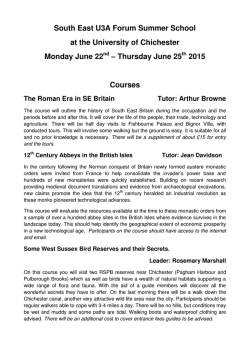


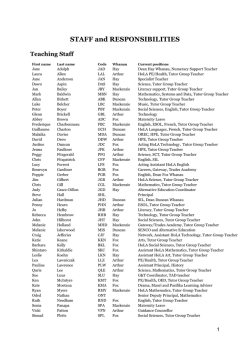
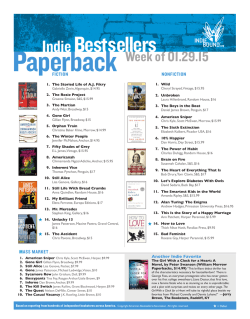
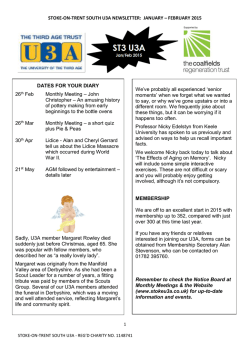
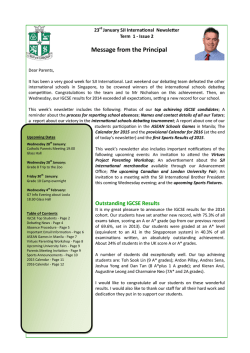

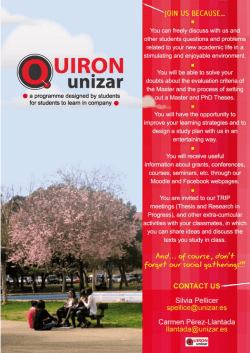
![January/February [PDF, 2.90 MB] - U3A Canberra](http://s2.esdocs.com/store/data/000481067_1-295b58ede6c95bb57d2c93c7d40b82f0-250x500.png)
